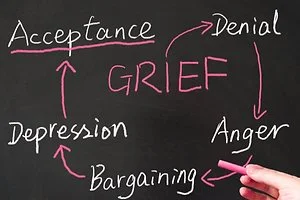I think it's fair to say that we have all had some experience of loss or bereavement, whether that be a relationship, pet, friendship, death of a relative or friend or one of the many other types of loss we experience multiple times through our life. The experience can vary for each individual and is very unique, but there are some common emotions that usually feature at some point along the way. This could include shock, anger, sadness, guilt, denial, longing or grief, to name a few.
One of the most famous models around loss or bereavement is the Grief Cycle which was originally formulated by Elisabeth Kübler-Ross in her 1969 book On Death and Dying.

There are 5 stages of grief laid out by Kübler-Ross:
1) Denial & Isolation - This may be when we withdraw from others in first experiencing the current or eventual loss. We often deny that it is real or think things along the lines of "This can't really be happening to me." This is often seen as a defence mechanism to deal with the shock and pain of the first stages of grief.
2) Anger - We can then begin to experience anger. This may be directed at the person at the centre of the loss but it can also be directed at others, for example, friends, family, the doctor who diagnosed the illness etc. Even if we know it is not the person's fault for the loss, we can still feel angry towards them and as a result, this can sometimes be hard to accept or express.
3) Bargaining - This can be where we try and avoid or prevent the loss. In a relationship, it might be the equivalent to saying "I will change, we can make this work" or with death, it could be thinking about "If only..." statement e.g. "If only we went to the doctors sooner" or similar. We may even bargain to God or a higher power that if we can prevent this loss we will do a certain thing or be a certain way. It is a way to avoid the inevitable or try and muster some hope in a hopeless situation.
4) Depression - This is where grief may enter our lives in a very deep and painful way. This is a natural reaction to the situation but can sometimes feel like we will never recover or find a way through. This stage can vary quite significantly in time span from weeks to years. Some may not even move on from this stage but if we are able to, then we will often find acceptance.
5) Acceptance - It is possible that we may not reach this stage in some situations. However, if we are able to, after moving through the 4 previous, difficult stages, this may be a time that we accept what has happened and feel calmer or more settled in ourselves. This does not necessarily mean forgetting or moving on from the other person, but it may be finding a way to live with the loss and continue with our lives. However, still with the inevitable times of sadness and pain.

Loss is a very personal and varied experience. The stages outlined above are a brief guide but they are not guaranteed, always in order or exclusive. We may feel a whole host of other emotions related to loss and bereavement and that is just our personal journey. It can take a varied amount of time and we all deal with it very differently. Accessing Counselling or having someone to talk to can be a very helpful tool in this journey whether it be the loss of a pet, job, relationship, or loved one. We may even have very strong experiences of grief for people we don't like or have not treated us well in the past. It is all completely natural and part of the process, despite it being a very difficult journey.
It can be very helpful to have support or someone we can talk to about our loss when we are experiencing it. However, many people feel that after a certain time, people are getting bored or don't want to hear about it anymore. This can be when we withdraw or keep our feelings to ourselves because we believe people aren't interested or they don't ask about our loss anymore. This may be a time that people access Counselling or other support services to help them through their journey or meet with people who are experiencing a similar issue.
One thing that is certain, is that this process can be very difficult, emotional and hopeless. Unfortunately, it is hard for it to be any other way because loss is often a very testing and varied experience. We can feel fine one minute and be in floods of tears the next from an unexpected trigger or memory. What seems to work best for people is to be open to the process and emotions that they experience through loss, and try and fine the best way for themselves to travel through this. Whether that be talking to a close friend or professional, taking up a new hobby or being active, meditation, journaling etc.
We have all experienced loss and millions have found their way through it so be kind to yourself through this difficult time and you will find your way.
If you feel that you would like some further support through your journey of loss then please feel free to use the contact details throughout the website to get in touch and I will book you in as soon as possible.